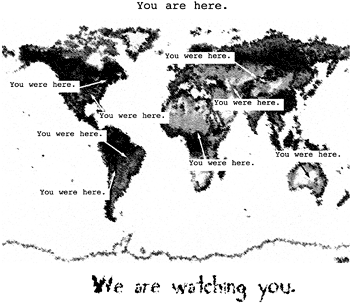Donate to IMPACT
Click below for info


• Over-Priced Musings
• Quickies
(music reviews)

• E-Mail Comments
• Archives
• Subscribe to IMPACT
• Where to Find
IMPACT
• Buy IMPACT T-Shirts
• Ordering Back Issues
• Home |

art/Marty Kelley
SATELLITE TRACKING
MOVES TO SHIPS
The greatest users of the Global Positioning System (GPS) are within the aviation industry. A close second are ocean going vessels, whose reliance on positioning is arguably more crucial, having almost no visual cues to know the location of their vessel while sitting on the ocean's surface. The GPS system allows people to know their exact position on the earth, and with recent advances, to within 10 meters, given ideal conditions.
Generally, such a system is passive, using a receiver to pick up the vergence of signals from a constellation of satellites in Earth's orbit. However, if one were required to obtain a system that not only received but also transmitted signals, the system could be tracked by satellite quite easily.
The watchful eye of government is now turning to the sea in the form of such GPS transmitters. Promised to usher in a new era of security and safety, there will soon be a mandatory tracking system imposed on all commercial vessels traveling the St. Lawrence Seaway. Operation of the St. Lawrence is jointly controlled by the United States and Canada, and connects the Atlantic Ocean to all of the Great Lakes via 1,400 miles of river, utilizing a system of locks. It is a major channel of commerce with dozens of major ports, allowing such cities as Milwaukee, Chicago, Cleveland, Montreal, and Toledo access to the sea.
The Seaway's new tracking system, called the Automatic Identification System (AIS), is now in final testing and will be deployed at the beginning of the 2003 navigation season. Hailed as a new era of security and safety, the system will offer unprecedented government control over the channel from three tracking stations, and will be able to know the position of every ship in every kind of weather. It will offer better scheduling of ship movement through the locks, and better ship-to-ship communications as well, allowing ships to more easily avoid collisions.
Though this system has been in the making for about a decade, one must wonder if the process was not recently pushed along with the advent of terrorism on U.S. soil. Millions of cargo containers entering U.S. ports go uninspected, sending jitters up the spines of legislators sworn to protect their citizens against whatever nasty items might be smuggled inside them.
Aside from the traditional contraband cargo of drugs and illegal immigrants, the more pressing concern about the contents of cargo containers are terrorism-related. Radiological, chemical, or biological weapons are what the U.S. is exhaustively looking for now. The only way to prevent weapons of mass destruction or terrorists themselves from entering the country through the seaway is to thoroughly inspect all suspicious container ships leaving or entering.
We are far from such across-the-board inspection--currently only 2% of all containers are inspected. But this trial run on the St. Lawrence River will serve as a test case for future implementations, as the jurisdictions using such a system will likely be broadened in the future. There is currently a proposal pending before the United Nations' International Maritime Organization (IMO) to put in place a new system that will track all vessels worldwide by 2008. The United States recently asked the UN to bump it up to January 2004, but was met with resistance.
Imposing such broad inspections on commercial traffic is probably a good idea to safeguard our vulnerable ports. However, many times in the past we have observed the phenomenon of "function creep," or the evolution of a good idea into a monstrously larger bad one.

Once active satellite tracking of all ocean vessels is put into place and increases the effectiveness of security dozens of times over, the technology may move to land-based shipping and transportation, such as commercial trucks and buses. After all, in these times of terror, trucks are often inspected at the entrances to major bridges and tunnels. Wouldn't it be nice to divert those human resources somewhere else and let a computer alert us to when an unregistered truck tries to cross a major thoroughfare? And wouldn't we all be safer if we had the government looking after private citizens with a mandatory satellite-based vehicle tracking system?
Early adopters already have such systems such as OnStar in their Cadillacs, which allow authorities to know exactly where one is in the event of an emergency. Currently, such transmission of one's whereabouts by private citizens is voluntary. But tracking of people and their vehicles has uses by governments and industries that are being developed on an as-needed or as-desired basis, and once the usefulness of that information becomes apparent, mandatory tracking could soon extend to private citizens.
For instance, police have used records from the northeast's E-Z Pass toll collection system and New York's Metrocard system as circumstantial evidence in criminal cases to prove whereabouts of people at the time of crimes. Perhaps E-Z Pass could expand their powers to stop speeding motorists, or Metrocard could bind the currently anonymous card to someone's personal information.
Insurance companies in the future may refuse to insure a car if it does not contain a tracking device, or perhaps charge more money if they find that the driver spends too much time in areas where their car is more likely to be stolen.
Private investigators may use this information to track cheating significant others when records show they've driven to places inconsistent with their alibis. This information about social habits could also lead to politically damaging blackmail and extortion of individuals, making people reluctant to engage in politics out of fear.
Private industry might use behavioral data for matching against previously established behaviors. This would further classify individuals into markets for more finely tuned advertising.
"The control of GPS tracking information will be a significant public policy issue several years from now," says Phil Agre, an associate professor of information studies at UCLA and a member of the board of the Electronic Privacy Information Center.
Once government and industry possess information not just about your buying habits (which they already have) but your movements, things will get very hairy. If such intentions turn out to be benign, the very best thing that will happen will be a billboard tailor-made just for you that pops up on the side of the road as you drive by it. But dear God, I can't even begin to imagine the horrible possibilities if you ever make an enemy of the government.
There will be nowhere to hide from GPS except underwater, and I don't know anyone who's selling submarines cheap.
• Email your feedback on this article to editor@impactpress.com.
Make an IMPACT
Other Overpriced Musings by Don Pflaster:
|




